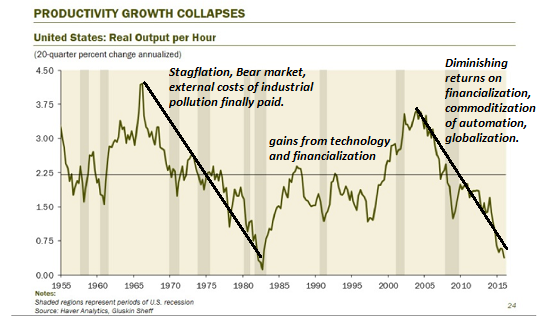International Workers' Day: Profitable Work Will Be Automated, The Rest Will Be Left to Us
May 1, 2017
Everyone wants an abundance of "good paying" jobs, but employers can only afford to pay employees if the work being done is profitable.
What's abundant and what's scarce? The question matters because as economist Michael Spence (among others) has noted, value and profits flow to what's scarce. What's in over-supply has little to no scarcity value and hence little to no profitability.
What's abundant is unprofitable work, commoditized goods and services, and conventional labor and capital (which is why wages are declining and yields on capital are near-zero).
What's scarce is profitable work, highly profitable niches that are immune to commoditization/ automation, and meaningful work.
Everyone wants an abundance of "good paying" jobs, but employers can only afford to pay employees if the work being done is profitable. Paying people to do unprofitable work is a one-way street to bankruptcy.
Those who want the government to fund "good paying" jobs forget that government tax revenues depend on profitable enterprises and the private-sector wages they pay.
(Borrowing from our grandkids to pay public-sector wages today is immoral and financially unsustainable.)
If we look at urban slums and impoverished rural communities, we find the problem isn't a lack of work that needs to be done--it's a lack of paid work and a lack of profitable work.
Businesses have pushed unprofitable work onto the customer. Paying people to pump customers' gas is not profitable (if it was, some corporation would be doing it). Rather than lose money by paying employees to pump gas, the industry shifted that unprofitable labor onto customers.
A great amount of useful work is not profitable and can never be profitable. We need to differentiate useful work from profitable work. One example that illustrates the difference is building and maintaining bikeways to serve commercial areas. (By this I mean bikeways not devoted to leisurely rides through parkways but bikeways that one can use to reach grocery stores, banks, post offices, cafes, childcare centers, etc.)
The work of building and maintaining safe bikeways is clearly useful. Safe bikeways have multiple benefits for commerce, communities, the environment and for individuals: safe commuter bikeways cut traffic congestion, improve the health of the bicyclists, lower healthcare costs, boost small businesses along the bikeways and reduce air pollution.
Safe bikeways (i.e. those which are dedicated to bikes so riders aren't sharing the road with semi-trucks and autos wandering over the pavement while the driver is texting) are win-win-win, yet they can never be profitable unless bicyclists are charged a toll, which defeats the entire purpose of the bikeway.
Impoverished areas are impoverished because there are few highly profitable scarcities to fill and few people with the surplus income to pay for profitable services. Taking money from one community to fund make-work jobs in another community (the essence of government redistribution schemes) deprives one community of income while providing a temporary injection of income in the other community--income that is controlled by a government that is itself controlled by lobbyists and privileged elites.
Redistribution schemes act as bread and circuses to suppress social disorder, but they don't address local scarcities in a sustainable way or foster the expansion of long-term solutions to a lack of work.
There are two fundamental solutions to a lack of profitable work. One is to pay people to do useful work that is not profitable and do so with a labor-backed crypto-currency that isn't borrowed or taken from some other community, and the second is to nurture community-economy entrepreneurship that works within decentralized networks and groups rather than through central states and global corporations.
I explain how these solutions work in my book A Radically Beneficial World: Automation, Technology and Creating Jobs for All.
Slums that get Universal Basic Income transfers from the government remain slums. All the work that needs to be done isn't being paid,soit doesn't get done.
Communities that rely on global corporations sink quickly into impoverishment when those corporations pull up stakes and move to cheaper locales or automate the profitable work.
Communities that foster small-scale entrepreneurship, local efforts to address local scarcities and paid useful work thrive in ways that contrast sharply with communities dependent on bread and circuses and global corporations.

The model of expecting global corporations and Big Government to solve the scarcity of paid work is broken. Paul Mason does an excellent job of explaining why in this article from mid-2015: The end of capitalism has begun: the rise of non-market production, of unownable information, of peer networks and unmanaged enterprises.
Isn't it obvious that we need a new system?
If you found value in this content, please join me in seeking solutions by
becoming
a $1/month patron of my work via patreon.com.
Check out both of my new books, Inequality and the Collapse of Privilege ($3.95 Kindle, $8.95 print) and Why Our Status Quo Failed and Is Beyond Reform ($3.95 Kindle, $8.95 print, $5.95 audiobook) For more, please visit the OTM essentials website.
NOTE: Contributions/subscriptions are acknowledged in the order received. Your name and email remain confidential and will not be given to any other individual, company or agency.
|
Thank you, Laura D. ($50), for your magnificently generous contribution to this site -- I am greatly honored by your longstanding support and readership. |
Thank you, Frank S. ($5/month), for your supremely generous pledge to this site -- I am greatly honored by your support and readership. |

Discover why Iím looking to retire in a SE Asia luxury resort for $1,200/month. |